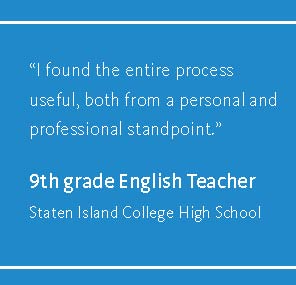This series of blogs will summarize and highlight important portions of our recent white paper, The New York City DOE/CUNY Library Collaborative: Bridging the Gap Between High School and College, which you can view here.
The whitepaper presents the progression and processes of the New York Collaborative Curriculum Revision Project (CCRP), a collaborative of high school teachers, college faculty, and librarians formed to build upon the new Common Core State Standards and better prepare students for post-secondary success. The posts will include sections quoted from the white paper as well as our own editorial.
Part 8: Student Assessments
To properly determine the results of the CCRP, the Collaborative plans to track students who went through the revised curriculum and compare their college remediation and results to a control group. In a larger sense, hopes for success lie in creating meaningful collaboration between secondary schools and colleges in order to enhance their overall curriculum.
In high school, however, the question of “doing better” is trickier than it might seem. Will the students perform better on new Common Core aligned standardized tests? Much remains to be seen about the quality of these tests. In any event, a passing familiarity with research undergirding the common Core exposes why any single standardized test is a problematic measure. Text complexity has a highly subjective component, dependent on a students’ background knowledge. Therefore, while of course the hope is students who experience the revised units will perform better on these tests, the focus is more on the fact that the revised curriculum is indeed Common Core aligned.
As many K-12 educators have learned, aligning with Common Core often requires a shift in what students do during the school day. We must ask, then, not only if they are doing things better, but if they are doing better things. They must read more complex texts, write analytically, and gain greater experience in college-level research; not just do better on standardized tests or get better grades in high school.
While Librarians will always support increased research skills, it’s important for all involved to realize that high school cannot take on the responsibility of teaching everything. The CCRP model has, unexpectedly, resulted in participating college professors become more aware of the limited time, resources, and the external demands faced by high schools.
Improving student success is a shared endeavor. Recognizing and acting on this insight ultimately enriches education for all our students.
To learn more about the Collaborative and the CCRP, access the full whitepaper here. Read other entries in this blog series here
[alert-info]
About the Author
Geoff is a Renaissance man, who can often be found reading about obscure historical topics, working on cars, or debating world affairs. He comes from a family of teachers and has a BA in communications.
[/alert-info]Air Jordan 11 For Sale


